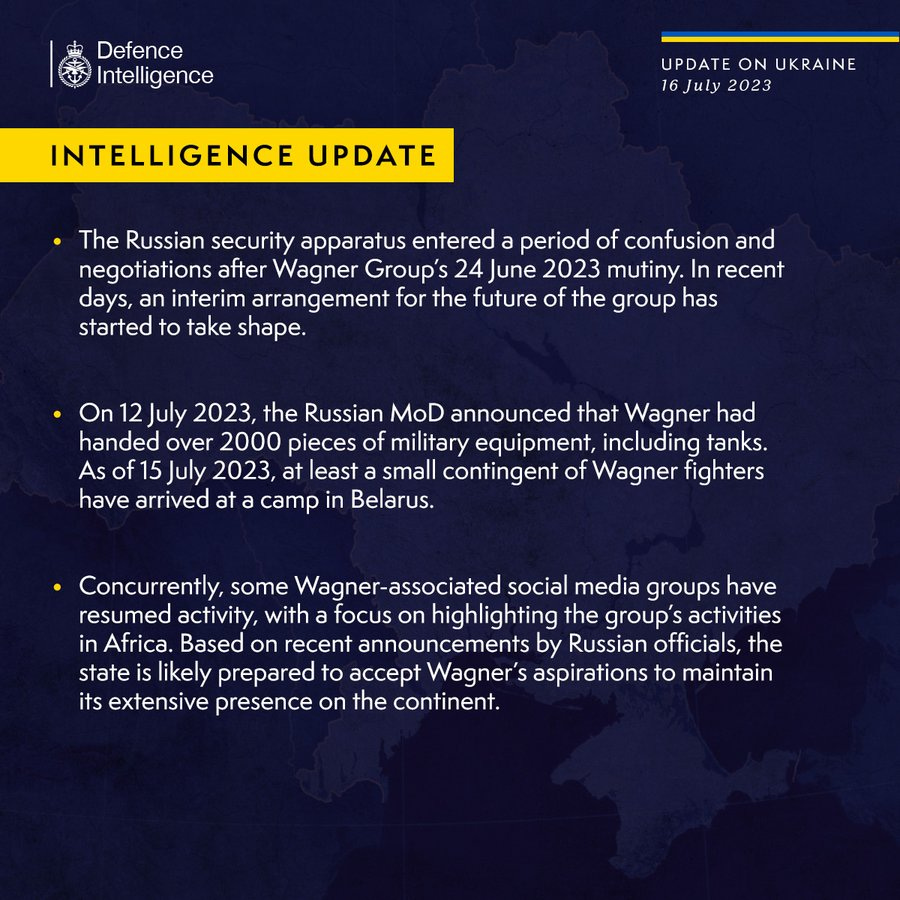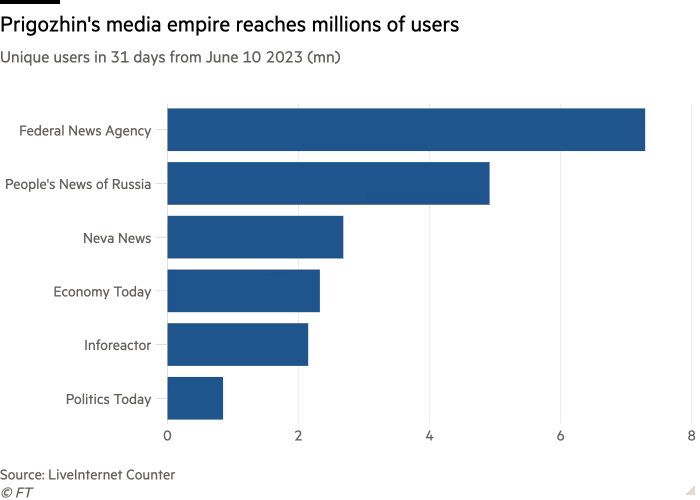Jul 17: E-Stories
Day 508: Zapo Berdyansk Luhansk Mariupol minefields Sevastopol RUarmypurges WagnerPutin Yellen HUN YellowRibbon Medics IRA NATO EE Shor grain Belarus A&P UKDef Erizanu Stognei/Seddon FT Avdeeva
Catching up…
EA Worldview’s Ukraine Up-date- hop over to Scott’s amazing hourly Ukraine up-date page. I’ll fill in with some bits and bobs.
Stories we’re following…
Zaporizhzhia shelling injures one, causes blackout in one neighborhood. Russian forces shelled Zaporizhzhia overnight on July 16, cutting electricity to part of one neighborhood of the regional capital city and injuring one person, acting mayor Anatoliy Kurtiev reported.
Russia shells 8 communities in Sumy Oblast. Russian forces shelled eight communities in Sumy Oblast on July 15, according to the Sumy Oblast Military Administration. Russia launched 16 strikes on the oblast over the past 24 hours which resulted in at least 137 explosions.
Loud explosions heard in occupied Luhansk, Berdiansk, Mariupol. Explosions were reported in the occupied cities of Luhansk, Berdiansk, and Mariupol on social media on the morning of July 16. In the the village of Yubileiny, a missile weapons depot was hit.
Ukraine’s Defence forces have advanced by more than one kilometre on the Berdiansk front, reports Valerii Shershen, spokesperson for the Joint Press Centre for the Tavriia Front Defence Forces, in a video address.
Fighting in eastern Ukraine has “somewhat intensified” as Ukrainian and Russian forces clash in at least three areas on the eastern front, a senior Ukrainian defence official said on Sunday. Deputy defence minister Hanna Maliar said on Telegram that Russian forces have been attacking in the direction of Kupyansk in the Kharkiv region for two successive days. Maliar also said the two armies were pummelling one another around the ruined city of Bakhmut but that Ukrainian forces were “gradually moving forward” along its southern flank, Reuters reported.
Deputy Minister of Defense of Ukraine Anna Malyar said that Russian troops have been actively advancing in the Kupyansk direction in the Kharkiv region over the past two days. Fierce battles are going on there, "the position of the parties is changing dynamically several times a day," the deputy minister says.
Washington Post: Extensive minefields hamper Ukraine’s counteroffensive progress. Ukraine has received less than 15% of its requested demining and engineering equipment from the West, the Washington Post reports, citing an official who spoke on conditions of anonymity. Areas between five and 16 kilometers deep have been densely mined with antitank and antipersonnel mines and trip wires in front of Russian forces’ main strongholds.
Throughout the week, Ukrainian forces destroyed over 10 Russian boats "In South Operational Command's area of responsibility, where the front line crosses Dnipro river, counter-battery warfare continues," spokesperson reported.
Russia’s air defence forces and fleet in the Black Sea intercepted 9 Ukrainian drones over Sevastopol (Crimea) early on Sunday, a Moscow-installed official said. Maritime transport, including passenger ferries, was suspended for several hours early on Sunday, authorities said.
Putin says Wagner Group doesn’t legally exist. Putin met with Wagner Group on June 29 and offered them “several options for employment,” including — under the leadership of their direct commander, call sign Sedoy. Kolesnikov also asked Putin if Wagner Group would remain “as a combat unit.” To this, the Russian president replied:
“We don’t have a law on private military organizations! It simply does not exist! <…> The group exists, but legally it does not exist! This is a separate issue related to actual legalization. But this is a question that should be discussed in the State Duma, in the government. It’s not an easy question,” Putin added.
ISW: The reported dismissal of the commander of Russia's 106th Guards Airborne (VDV) Division may be a part of an ongoing purge of insubordinate commanders and may suggest that the corrosion of the Russian chain of command in Ukraine is accelerating.
The Russian military command recently dismissed 58th Combined Arms Army Commander Major General Ivan Popov after he reportedly attempted to bypass Army General Valery Gerasimov and bring his complaints about the situation in western Zaporizhia directly to Putin.
Maj Gen Seliverstov was considered a “Hero of Russia”: His VDV troops committed atrocities and war crimes at the beginning of the full-scale invasion of Ukraine in Hostomel, Bucha, and Irpin before they got annihilated.
The last vessel left the port of Odessa as part of the "grain deal", reports Reuters. The "grain deal" expires on July 17th. On July 13, Vladimir Putin said that the “grain deal” would be extended only if the “promises” given to Russia under the agreement were fulfilled.
“Western countries are not going to keep their promises. But as one of the options - not first the extension, and then the fulfillment of promises, but first the fulfillment of promises, and then our participation. What I mean? We may suspend our participation in this transaction. And if everyone once again says that the promises given to us will be fulfilled, well, let them fulfill these promises, and we will immediately join this deal, ”Putin said.
Putin said Russia had a “sufficient stockpile” of cluster bombs and that Moscow reserved the right to use them if such munitions were used against Russian forces in Ukraine. He added that Russia had not yet used the weapons despite a “certain shortage of munitions at some point”.
Maria Avdeeva: Kharkiv on February 28: one of the many cases of Russian use of Smerch cluster munitions in densely populated residential areas. On the same day, cluster munitions were used in Kharkiv by the Russian forces.
The Russian state has taken control of shares in the Russian subsidiary of French food producer Danone, according to a decree signed by Putin on Sunday. The decree also said that shares in Baltika Breweries, a Russian-based brewing company, would be transferred to state management, Reuters reported.
US treasury secretary Janet Yellen says redoubling support for Ukraine is the “single best” way to aid the global economy, AFP reports. Yellen, speaking on the sidelines of a G20 finance minister summit in India, said a “key priority” was “to redouble our support for Ukraine” in its defence against Russia. After visiting Kyiv in February, Yellen said she had seen first-hand “the massive difference” that foreign assistance was making, both to civilians and the Ukrainian military.
Media: Hungarian President to visit Ukraine in August. Hungarian President Katalin Novák's office told the news portal Telex on July 15 that she has accepted the Ukrainian government's invitation to attend the Crimean Platform in Kyiv.
Putin's girlfriend Alina Kabaeeva is selling one of her houses in Switzerland for $75,000,000. Her custom made $3,000,000 Rolls Royce is seemingly not yet for sale.
Training of Ukrainian pilots for F-16 flights in EU countries may begin in a couple of weeks. Biden's national security adviser Sullivan promised to give Europeans all the tools they need to get started.
Lithuanian president calls Belarus a ‘Russian province,’ urges increasing defense. NATO leaders urged Minsk to end its complicity in Russia’s war of aggression against Ukraine and adhere to international law at the Alliance’s 2023 Vilnius Summit on July 11-12.
“Russia’s deepening military integration with Belarus, including the deployment of advanced Russian military capabilities and military personnel in Belarus, has implications for regional stability and the defense of the alliance,” the Vilnius summit communiqué read.
Meanwhile, exiled Belarusian opposition leader Sviatlana Tsikhaniuskaya called on NATO member states to include a democratic Belarus in their projected security architecture. She noted that, while Ukraine should be “in focus” during the NATO summit, Belarus should also be high on the agenda, adding that there can be no security for Ukraine without freedom for Belarus.
Estonia will increase defense spending to 3% of GDP and buy ammunition for 1.2 billion euros, as announced by the Minister of Defense Hanno Pevkur, who approved the plan for the development of the country's armed forces for the next three years.
“Planning is a key task in national defense. The full-scale war of Russia against Ukraine clearly shows what opportunities we need to invest in. Bringing national defense spending to 3% of GDP allows us to do this,” Pevkur said.
Prigozhin’s ‘toxic’ media empire left in Kremlin limbo-FT
Prigozhin’s notorious troll army has kept up its frenetic posting rate online, while the former caterer has remained in Russia — even meeting Vladimir Putin in the Kremlin — despite a deal to leave for exile in Belarus.
The curious afterlife of Prigozhin’s fake media empire is a window on a bigger challenge for Putin’s Russia: the regime is still struggling to unwind its tangled ties to the warlord, even after Wagner came close to overthrowing it.
With his businesses in no-man’s-land, other members of the elite are discussing filling the huge Prigozhin-shaped hole in Russia’s political system — and taking over the billions in funding under the table that come with it.
“The system is a criminal organisation. Prigozhin is part of that,” a sanctioned Russian oligarch said. “People are making money on the war, and wealth is being redistributed. This internal corruption is a systemic feature.” [continue]
Medics on the front line in Ukraine
Ukraine is currently doing Nato’s job for it—FT
It is sometimes difficult to appreciate the significance of major global changes while they are happening. Our analyses, instincts and actions are rooted in what we already know, not fully appreciating the new environment in which we find ourselves. We focus on the past when what we should really do is focus urgently on the future.
This is perhaps the best explanation of what took place this week at the Nato Summit in Vilnius, Lithuania. The alliance did very well at what it already knows how to do. It reiterated its “ironclad” commitment to defend every inch of its territory, reaffirmed Nato’s nuclear strategy, adopted defence plans for all regions of the alliance, committed yet again that each member state would spend at least 2 per cent of GDP on defence and addressed a wide range of security challenges.
Nato offered no assurances beyond what it said in 2008 when it affirmed that Ukraine would become a member one day. There is no actual process to achieve that goal. Indeed, the Vilnius language can be seen as weaker, stressing that an invitation will be offered only when “all allies agree” (meaning they currently do not), and when “conditions are met” (meaning there are conditions yet to be fulfilled). The exact nature of these conditions remains vague.
This is not just a missed opportunity. It reflects a failure to understand that the nature of European security has changed. Ukraine is currently doing Nato’s job for it — fighting to defend the frontier of a free Europe. It is more capable militarily than most allies, and defending the values on which Nato is founded. Russia is attacking Ukraine because it seeks to defeat those values: Kyiv remaining stuck in the Nato waiting room is a green light for Putin to attack again.
There is now a fundamental contradiction between Nato’s commitment to the security of the alliance and its refusal to give Ukraine a clear pathway to membership. With a nuclear-armed, imperialist Russia laying claim to swaths of territory that belong to other countries — and foisting a proxy war on the entire continent — it is hard to see how Nato can accomplish its mission of defending Europe without accepting Ukraine as a member. This is the contradiction that needs to be addressed urgently, so that a firm invitation can be extended when the allies meet again next year.











